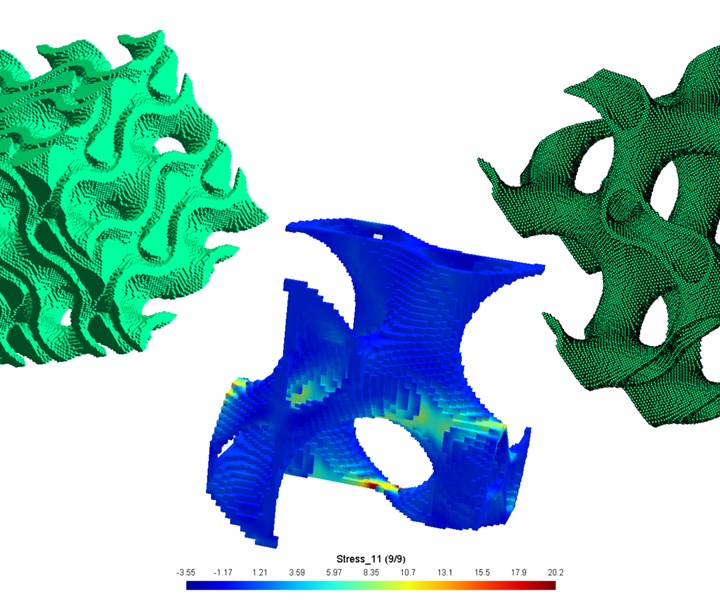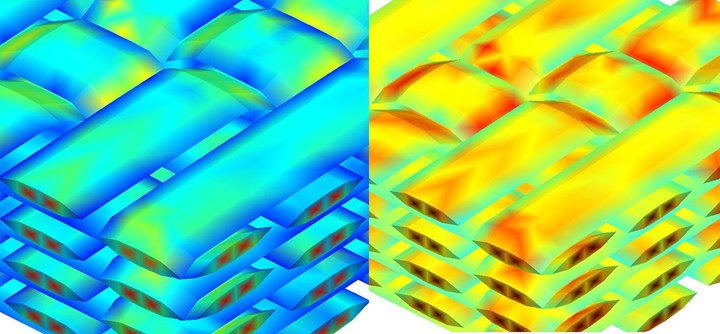Siemens acquires MultiMechanics, adds material modeling to Simcenter
The acquisition adds MultiMechanics’ TRUE Multiscale failure prediction technology to Siemens’ Simcenter for composites design simulation.

Siemens’ acquisition of MultiMechanics integrates advanced modelling of failure and damage of 3D-printed lattice structures and meta materials. Source | Siemens
Siemens (Plano, Texas, U.S.) has signed an agreement to acquire MultiMechanics Inc. (Omaha, Neb., U.S.), developer of MultiMech finite element analysis (FEA) software that helps companies virtually predict failure in advanced materials at an unprecedented level of speed and accuracy. Siemens plans to integrate MultiMechanics into its Siemens Digital Industries Software branch. The acquisition is due to close this month.
MultiMechanics’ TRUE Multiscale technology helps companies to efficiently predict material properties and behavior, including failure starting at the microstructural level, with reportedly high levels of speed and accuracy. This technology will be incorporated into Simcenter software within Siemens’ Xcelerator portfolio, implementing materials engineering into the digital workflow and establishing a pervasive link between material developers, manufacturing process developers and part designers.
“Customers will have the ability to fully exploit the potential of advanced materials to optimize weight and performance in an efficient way that is not possible with classical, test-based, approaches,” says Jan Leuridan of Siemens.
Siemens says its acquisition of MultiMechanics expands the ability to create the most comprehensive digital twin by integrating structural computer-aided engineering (CAE) with detailed materials modeling through TRUE Multiscale technology, for a range of materials including composites, polymers, ceramics and metals. Manufacturing technologies such as injection-molding and additive manufacturing will reportedly see immediate applications, as the digital twin of materials can account for manufacturing variability and imperfections, identify the root cause of material failure at microstructure level, optimize material microstructure for best performance, and enable the creation and virtual testing of new material systems.

According to Siemens, Simcenter software will be able to virtually predict failure in advanced materials such as composites, at an unprecedented level of speed and accuracy. Source | Siemens
“The addition of this technology enables our customers to build a digital twin of materials, which will help to shrink the innovation cycle of new products and materials, possibly saving millions of dollars and several years in development and certification in aerospace, automotive and other sectors,” says Jan Leuridan, senior vice president, Simulation & Test Solutions, Siemens Digital Industries Software.
“The combination of the TRUE Multiscale technology of MultiMechanics with Simcenter 3D software will provide a strong basis for further innovation, enabling an expansion of scope of structural simulation to include multi-physics support for applications such as minimization of part distortion, prevention of voids during material flow, and prediction of visco-elastic acoustic properties,” says says Flavio Souza, President and CTO, MultiMechanics Inc.
“We are confident that as part of Siemens, MultiMechanics’ technology can accelerate innovation in, and adoption of, complex materials, including the further penetration of composites in the automotive and aerospace industries,” says Nicolas Cudré Maroux, chief technology officer at Solvay (Alpharetta, Ga., U.S.,), a major customer and shareholder of MultiMechanics.
Related Content
-
Optimizing a thermoplastic composite helicopter door hinge
9T Labs used Additive Fusion Technology to iterate CFRTP designs, fully exploit continuous fiber printing and outperform stainless steel and black metal designs in failure load and weight.
-
Optimized approach to predict delamination failure in CFRTP structures
ARRK Engineering and Mitsui Chemicals improved delamination prediction accuracy to help optimize absorbed energy/failure load for an overmolded TAFNEX CF/PP UD tape bumper beam.
-
Composite sidewall cover expands options for fire-safe rail components
R&D project by CG Rail explores use of carbon fiber-reinforced thermoplastics and recycled manufacturing scrap to meet fire safety, weight and volume targets.

.jpg;width=70;height=70;mode=crop)












.jpg;maxWidth=300;quality=90)
